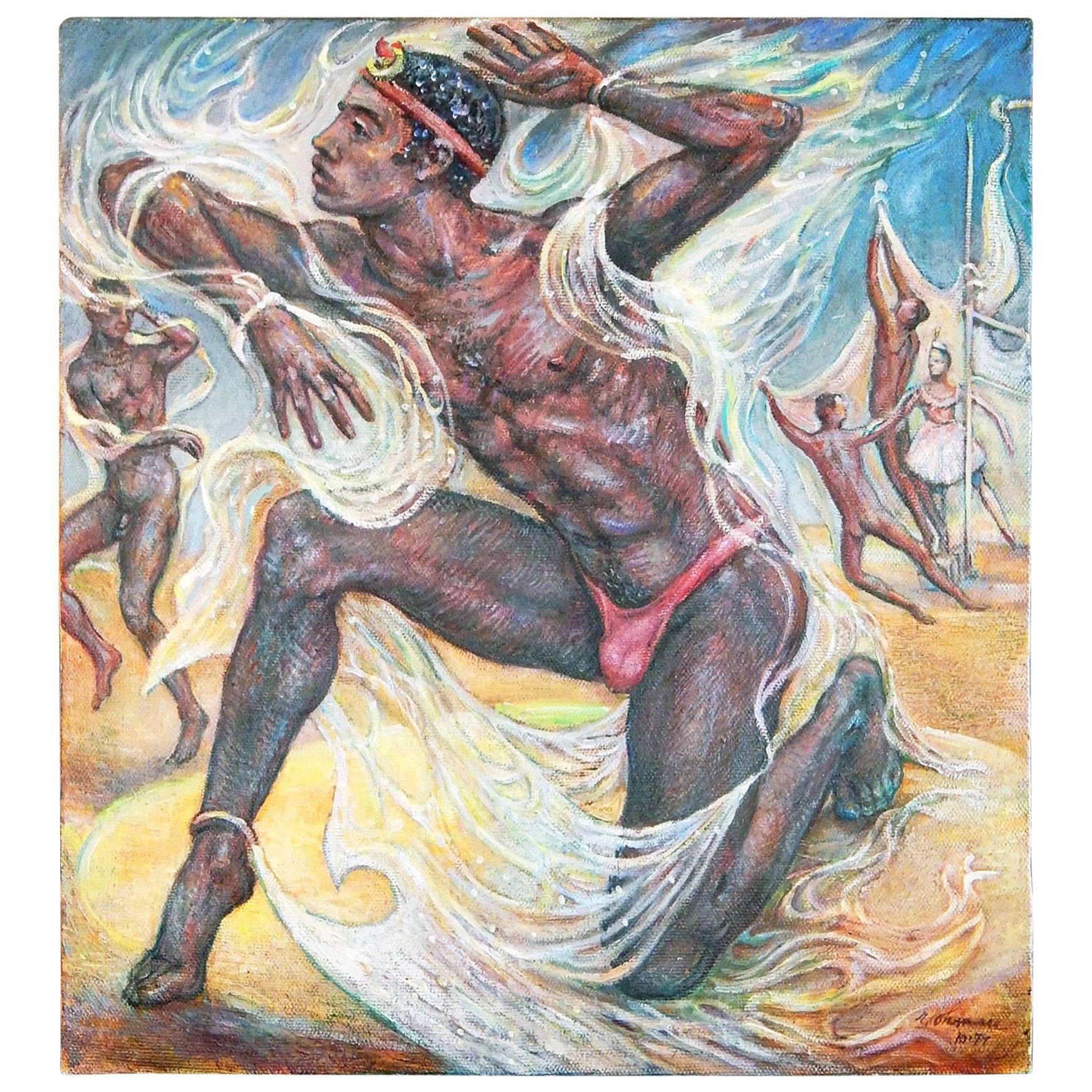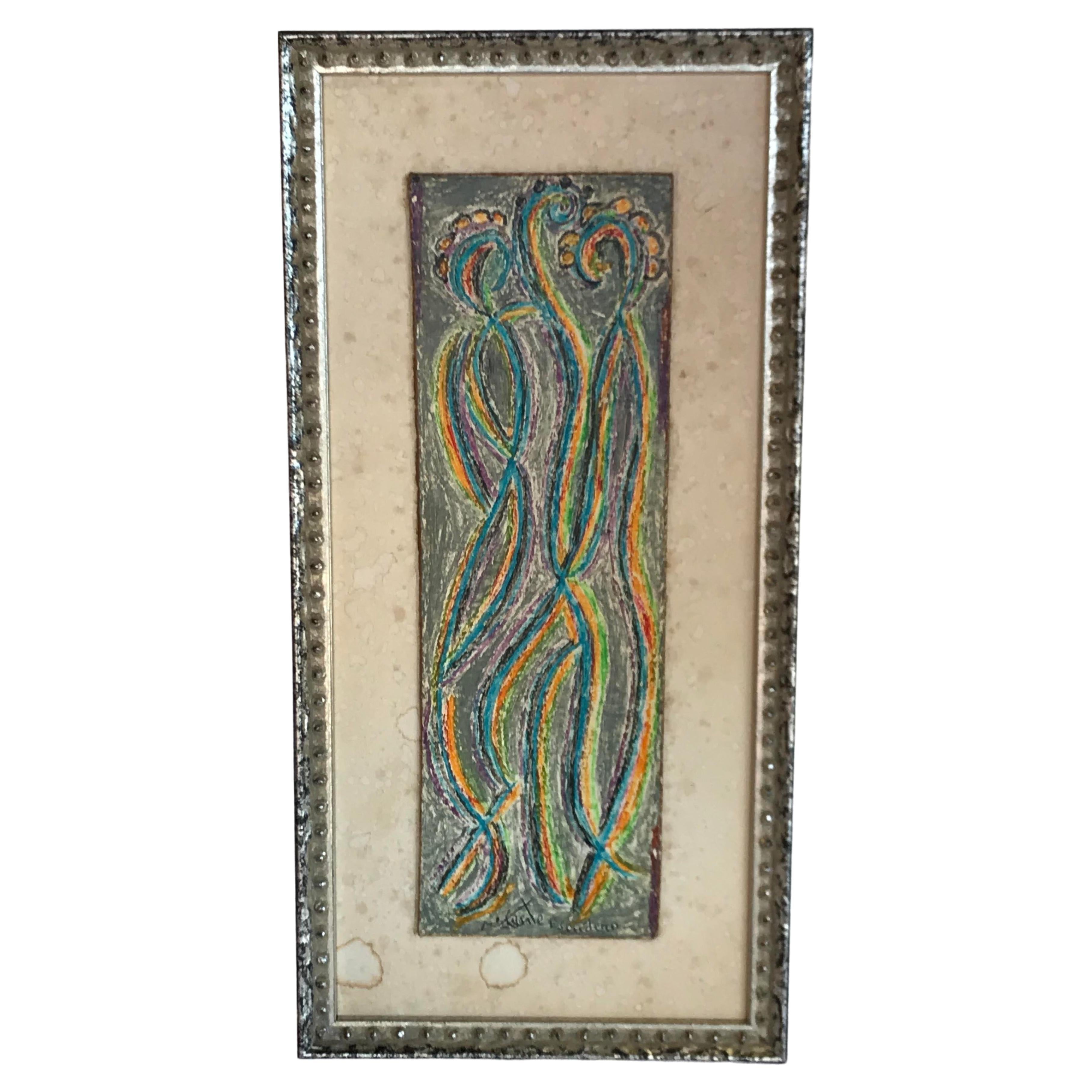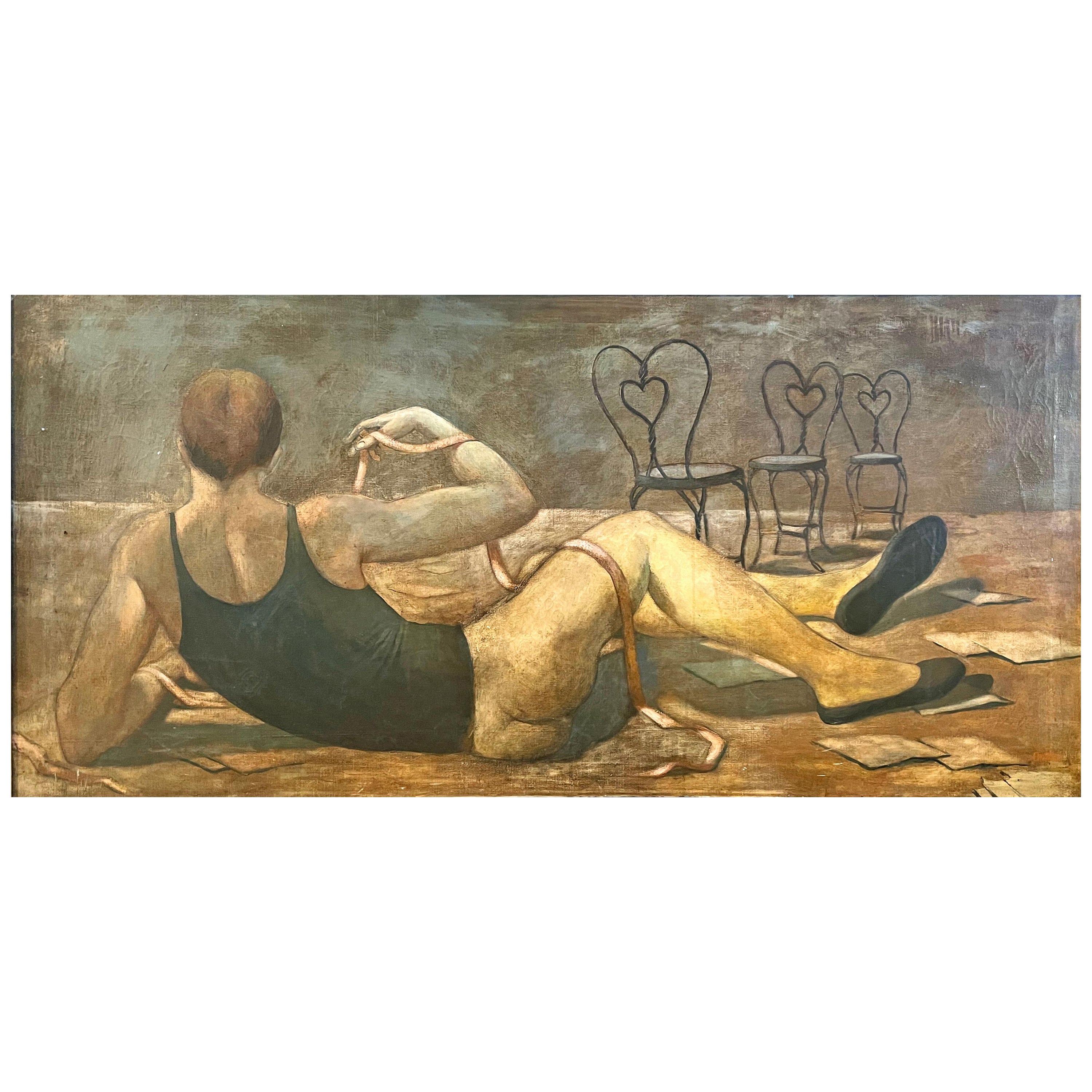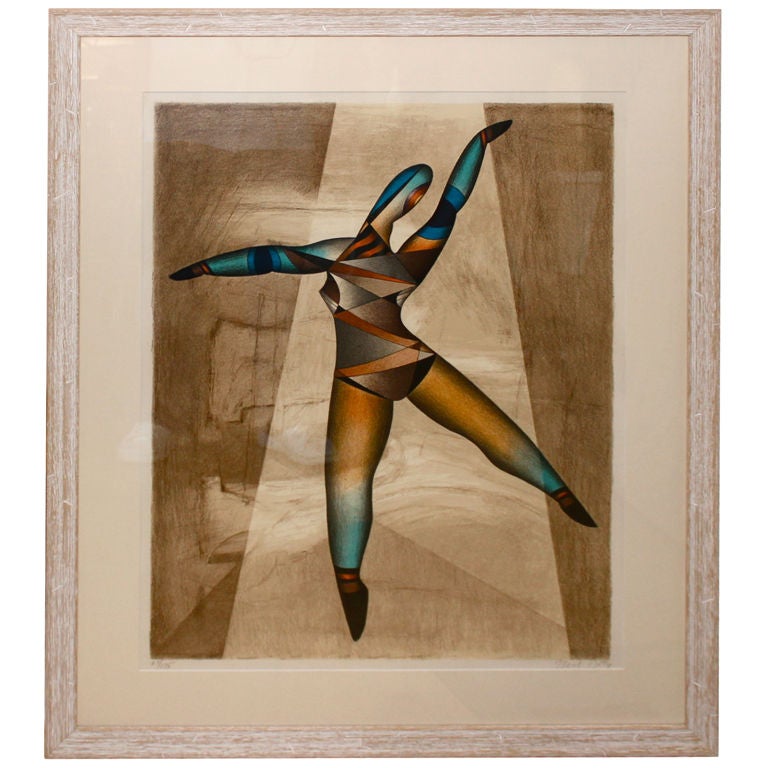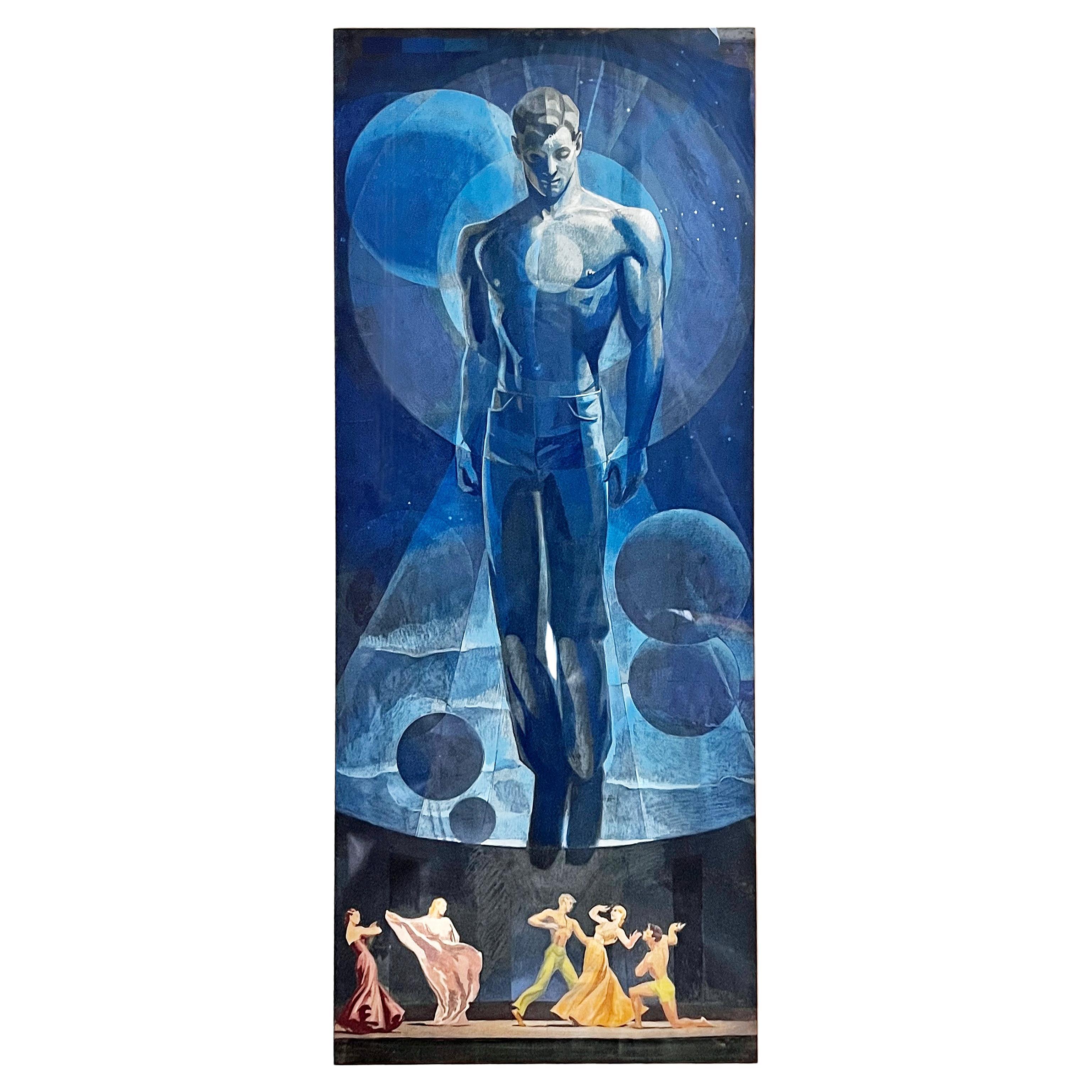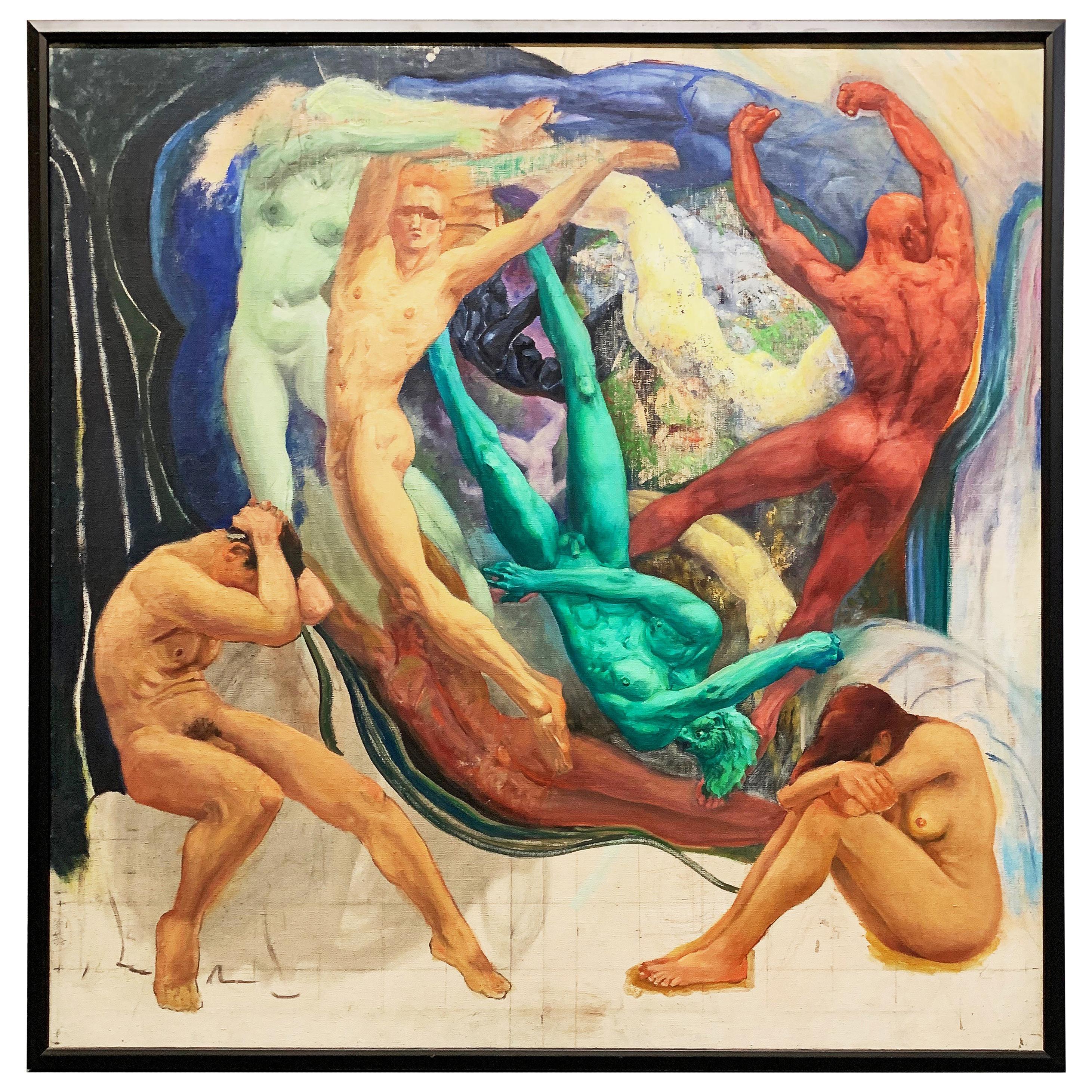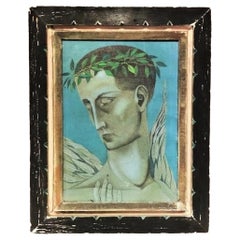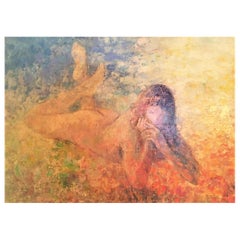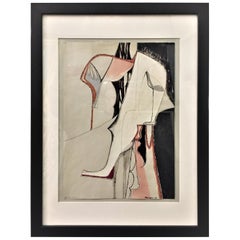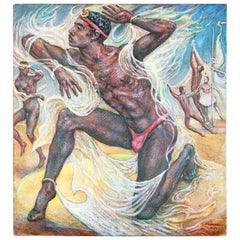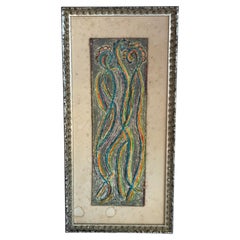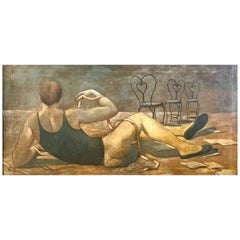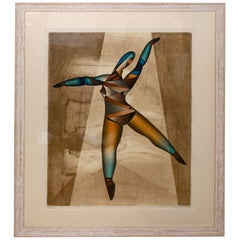Items Similar to Alexander Cañedo, Dancing Man, Surrealistic O/C Painting, ca. 1950’s
Want more images or videos?
Request additional images or videos from the seller
1 of 8
Alexander Cañedo, Dancing Man, Surrealistic O/C Painting, ca. 1950’s
$4,500
£3,393.45
€3,924.68
CA$6,313.48
A$7,017.82
CHF 3,678.59
MX$85,704.57
NOK 45,925.09
SEK 43,206.94
DKK 29,292.70
About the Item
Mid-Century Surrealism
Alexander Cañedo
Dancing Man
Oil on Canvas
ca. 1950’s
PAINTING DIMENSIONS:
Canvas: 44 x 44 cm (17-3/8 x 17-3/8 in.)
Framed: 68 x 68 cm (26-3/4 x 26-3/4 in.)
Alexander Cañedo (Mexican-American, 1902 – 1978) was born in Mexico City as Alejandro de Cañedo; his father was a Mexican government official and his mother was from the United States. In 1918, when Cañedo was 15, his parents sent him to École nationale supérieure des Beaux-Arts in Paris where he studied under the sculptor Jean Magrou. In 1923, Cañedo traveled to Rome where he continued his art studies. In 1927, Cañedo briefly returned to Mexico. During that trip, the Mexican Government appointed him attaché to the Mexican Embassy in Rome.
In 1928, Cañedo held his first art exhibition with the Circolo Artistico in Rome, a collection of pencil drawings. More exhibitions followed in other cities in Europe. That same year, he traveled to the New York City where he exhibited widely. At this point, he began signing his work with just his last name; eventually, he also Anglicized his first name as "Alexander" and dropped the "de".
Cañedo was commissioned in 1929 to illustrate the amatory novel Orientale: The Adventure of Therese Beauchamps by the French author Francis de Miomandre. The highly stylized Art Deco results were so successful that he retained Cañedo the following year to illustrate his next novel, The Love Life of Venus.
In 1932, Cañedo was invited to have a solo show of his pencil drawings at Walter P. Chrysler, Junior's newly opened Cheshire Gallery, located in the Chrysler Building. He also had a solo exhibition at the Argent Galleries, and participated in shows of the Art Students League of New York, of which he was an active member.
By the mid-1930s, Cañedo began exhibiting watercolors. These were shown at solo exhibitions at the Arthur U. Newton Galleries. He expanded to work in oil paint and in the early 1940s, such work was exhibited at the Arthur U. Newton Galleries and the Schneider-Gabriel Galleries of New York. Beginning in 1947 and over the next decade, he produced many illustrations for the covers of science fiction magazines such as Astounding.
Traveling west, Cañedo held a solo show at Gump's Gallery in San Francisco in 1949, the first of many exhibitions at Gump's. That year, he also exhibited at the first annual Art League of California faculty show. In 1950, Walter Foster published an art instruction book titled How Cañedo Draws the Figure; it remained in print for five years.
Cañedo permanently relocated to California, dividing his time between San Francisco and Los Angeles, with frequent painting trips to the Monterey area. His work tended to be formally similar, with nude figures set in improbable, alien or abstracted landscapes, or featured natural objects such as seashells floating in such settings. During this time, Cañedo also produced many overtly homoerotic artworks for private collectors which were too suggestive to be exhibited in galleries.
His work remained in demand throughout the 1960s, with solo exhibitions at the James Pendleton Gallery, Galleria Gianni, Raymond & Raymond Gallery and the Arcade Gallery in the Beverly Hills Hotel. His works are included in the permanent collection of the Leslie Lohman Gay Art Foundation.
Cañedo died in West Hollywood, California on February 1, 1978
- Dimensions:Height: 17.38 in (44.15 cm)Width: 17.38 in (44.15 cm)Depth: 1 in (2.54 cm)
- Style:Mid-Century Modern (Of the Period)
- Materials and Techniques:
- Place of Origin:
- Period:
- Date of Manufacture:ca. 1950's
- Condition:Wear consistent with age and use. We make our best effort to provide a fair and descriptive condition report. Please examine photos attentively for they are an important part of the description. Send us a message to request more details or discuss price.
- Seller Location:New York, NY
- Reference Number:1stDibs: LU2819338834132
About the Seller
5.0
Gold Seller
Premium sellers maintaining a 4.3+ rating and 24-hour response times
Established in 1993
1stDibs seller since 2017
85 sales on 1stDibs
Typical response time: 8 hours
- ShippingRetrieving quote...Shipping from: New York, NY
- Return Policy
Authenticity Guarantee
In the unlikely event there’s an issue with an item’s authenticity, contact us within 1 year for a full refund. DetailsMoney-Back Guarantee
If your item is not as described, is damaged in transit, or does not arrive, contact us within 7 days for a full refund. Details24-Hour Cancellation
You have a 24-hour grace period in which to reconsider your purchase, with no questions asked.Vetted Professional Sellers
Our world-class sellers must adhere to strict standards for service and quality, maintaining the integrity of our listings.Price-Match Guarantee
If you find that a seller listed the same item for a lower price elsewhere, we’ll match it.Trusted Global Delivery
Our best-in-class carrier network provides specialized shipping options worldwide, including custom delivery.More From This Seller
View AllRichard Wilt, Caesar, American Mid-Century Modern O/C Painting, Ca. 1960s
By Richard Wilt
Located in New York, NY
ABOUT ARTIST
Richard Wilt (American, 1915 - 1981) > Chronology and Exhibition History
1915 Born in Tyrone, PA
1981 Died in Ann Arbor, MI
EDUCATION:
1...
Category
Vintage 1960s American Mid-Century Modern Paintings
Materials
Canvas
Bernard Taurelle, Nu, French Modernist Oil on Canvas Painting, circa 1960s
By Bernard Taurelle
Located in New York, NY
Signed lower right corner.
Stamped en verso Galerie Felix Vercel Paris - New York.
Original period frame.
Bernard Taurelle (French, B. 1931) is a famous French artist, widely known ...
Category
Vintage 1960s French Post-Modern Paintings
Materials
Canvas
Ignacio Gallo, Dancing with Satyr, Spanish Art Deco Silvered Bronze, circa 1920s
By Ignacio Gallo
Located in New York, NY
Ignacio Gallo (Spanish/French, 1850-1935) was a Spanish sculptor, who was active as a sculptor and engraver in Madrid and Paris in the interwar period. His works show animal scenes, ...
Category
Vintage 1920s Spanish Art Deco Figurative Sculptures
Materials
Bronze
Stanley Stangren, Modernist Abstract Mixed-Media Collage, circa 1964
By Stanley R. Stangren
Located in New York, NY
Dimensions:
Unframed: 11-1/2 x 8-1/16 inches
Framed: 17-1/8 x 12-7/8 inches
Signed by the artist and dated ’64 in the lower right corner; inscribed in German: Zurich, Schweitz (Zurich, Switzerland)
This unique work of art is a mixed-media collage on paper, where the artist had generously used his own pencil, gouache and watercolor drawing with a print cut-outs.
Stanley R. Stangren (1928–2014) was an outstanding American jeweler, artist, sculptor and ceramist, residing in New York City. He worked in different styles and in different materials, including oils, watercolor, ceramic and stone sculptures; and fine jewelry.
Stangren’s painting styles varied tremendously – from complete abstract works to Holocaust themes in the style of Georges Rouault and Hieronymus Bosch to portraits in the style of Moses and Raphael Soyer. He was also a passionate lover of the performing arts, and, as a young man, spent time studying dance at both the School of American Ballet and with Martha Graham. Although he worked with dance pioneers like Ms. Graham, Anna Sokolow and Charles Weidman, an injury prevented him from pursuing dance as a career. But he found other outlets for his artistic pursuits.
In his youth, Stangrem attended the Brooklyn Museum School of Art, and graduated from the High School of Music and Art in New York City. He later studied at the Boston Museum of Fine Arts, the Art Students League, Bard Colledge and in Europe. Stangren studied jewelry design in Europe, attending Staatlische Kunst Werkschule in Pforzheim, Germany and Kunstgewerbeschule der Stadt in Zurich, Switzerland. His jewelry and designs were received with great success. His combination of precious and semi-precious stones, high-karat gold and sterling silver, and exotic materials executed with outstanding workmanship in the abstract modernist style gave a unique aspect to his designs, the metalwork usually electroformed, cast, or fused in varying textures. After returning to New York in the later 1950s, Stangren opened and maintained a ceramic business in Trenton, New Jersey. Very few pieces of his work remain from this period.
When he retired from the ceramics business, he spent much of his time enjoying the arts. He frequently attended Juilliard performances, including most of the opera and drama presentations at the School, and was especially fond of the dance concerts. The last 40 years of his life, he taught painting in the New York area and worked with Metropolitan Museum of Arts in developing annuities, for future acquisitions.
In addition, Stangren left annuities for MoMa in support of educational programs and left, in his will or through his executors, art supplies for the Harlem School of Art and benefits for the Urban Assembly organization. Mr. Stangren's love for the arts and for the performances he was seeing at Juilliard inspired him to take his participation a step further and to establish charitable gift annuities with the School.
"I realized what Juilliard offered me, being a passionate music lover, and I decided to give something back" he said. "What Juilliard achieves is remarkable. When I think of the prominent actors, dancers and musicians that have been educated there, I am always staggered. It is deeply financially satisfying to be able to give back to the School, while benefitting from it at the same time." The Juilliard School is not the only organization that Stanley Stangren...
Category
Vintage 1960s Swiss Mid-Century Modern Paintings
Materials
Paper
Anton Pavlos, Couple of Skiers Racing Down Mountainside, ca. 1930s
By Anton Pavlos 1
Located in New York, NY
A Streamline Moderne style sculpture by Ukrainian artist Anton Pavlos (1905-1954), produced circa 1930s.
It depicts a couple of male and fem...
Category
Vintage 1930s American Art Deco Figurative Sculptures
Materials
Plaster
Rolph Scarlett, Modernist Abstract Composition, Guache on Paper, Ca. 1950’s
By Rolph Scarlett
Located in New York, NY
Artist: Rolph Scarletti (Canadian, 1889 – 1984)
Object: Modernist Abstract Composition
Period: Ca. 1950’s
Medium: Guache on paper, framed
Dimensions (unframed):
Height: 9-1/3”
Width: 12”
Dimensions (framed):
Height: 22-3/4””
Width: 25-3/4”
Rolph Scarlett (Canadian, 1889 – 1984) was a consummate explorer of twentieth-century abstract painting. Never afraid of trying new styles, curious and opinionated, constantly engaged with the world around him while steadfastly aware that he was on his own path and his alone, Scarlett more than once proved to be at the artistic zeitgeist of the eras in which he lived. Exposed very early on to the work of Paul Klee through a chance meeting in Europe with the artist himself, Scarlett took up abstraction with a fervor that never diminished during his long and impressive career. To create something that had never existed before: this was Scarlett’s great cause. And that is what is most obvious when you look at Scarlett’s work—you have never seen anything quite like it.
Scarlett was Canadian-born, came of age in the Midwest, and spent few important years in Hollywood, where he designed stage sets. His work from this early period echoes Klee’s use of color, his confidence in naïve, primitive forms, and his blend of abstraction and figuration. In its flat spatial qualities it prefigures the Indian Space painting of the 1940s by a decade. He moved to New York in 1933 and eventually found his first great patron at the Museum of Non-Objective Painting, directed by Baroness Hilla Rebay and art patron Solomon R. Guggenheim. Guggenheim would collect over 60 works by Scarlett for his collection, more than any other artist outside of Vasily Kandinsky and Rudolf Bauer.
As a frequent exhibitor and lecturer at the Museum of Non-Objective Painting (MNOP), Scarlett honed his sensitive feel for bodies in space and capitalized on his trademark use of bright, vivacious colors into accomplished, perfectly harmonized geometric works. However, Scarlett soon morphed these hard-edged forms into a nuanced expressionistic abstraction which, at its best, seems to be populated by dancing forms that animate the canvases. Along this way he was advised by Rudolf Bauer, the German expatriate and one of the originators of non-objective painting in the teens. Bauer had the idea for the Museum, and Rebay, his champion, had found in Solomon Guggenheim a patron for manifesting it. When Bauer emigrated just before World War II, he wanted to meet Scarlett. The two became friends, and Bauer advised Scarlett on his work over the course of many years. Even in a 1979 interview, Scarlett began to tear up as he recalled his first meeting with Bauer, a man whose work he "worshipped," describing that, "It was a touching moment for me, I’ll tell you."
Scarlett and Rebay also had a close, important relationship, one in which he bore the brunt of her sometimes condescending, if motherly, critiques and admonitions with tolerance and gratefulness. Eventually, though, he had to push back. In a letter from 1951 he writes, "I have noticed with growing amazement that during the past three years you have accepted less and less of my work—and, that same work, which you rejected has been accepted and shown in the best and largest shows all over this country."
This period—the late 1940s to the early 1950s—did in fact correspond to Scarlett’s most critical success, and to a return to the fanciful forms and characters of his pre-war work. At the same time, he found his own rhythm and complexity using a drip style similar to, though denser and more opaque than, the one made famous by Jackson Pollock, who had worked for many years at the MNOP and with whom he shared common influences. In 1949 he had a very well received solo show in 1949 at the Jacques Seligmann Gallery, reviewed very favorably in The New York Times: "The impression made by these paintings is one of originality and strength." He was also included in a juried show "American Painting Today" at the Metropolitan Museum of Art in 1950 and in the Whitney Annual of 1951. The curator for the Whitney show in fact bypassed a selection of Scarlett’s careful geometrics in favor of a new "lyrical" drip painting—one which he describes as having had "a helluva good time" making.
Rebay articulated her loss of control over Scarlett very keenly in one of her last official letters to him: "So your way ended in the horrid jungle it is in now; even a Mr. Pollock’s smearage was not bad enough for you to have a try at; and betraying yourself, you betrayed art and my faith in you, and my present disgrace by my failure to foresee such an outrageous possibility—since you even paint objectively now."
Yet, despite the fact that he was moving in his own direction when the change in leadership took place at the Museum of Non-Objective Painting and Rebay was forced out as director, Scarlett was hit hard. He understood this change rightly as a betrayal by the establishment. Scarlett was a unique individual and soul, and was affected personally and philosophically by the idea that the movement with which Scarlett had aligned his talents seemed to disappear overnight, and his life’s work rendered valueless.
Without the Museum’s support, Scarlett decided eventually to move to the artists’ community of Shady, New York, just outside of Woodstock. He had occasional shows throughout the years, but mostly settled down to regional obscurity. He began making jewelry, which had been his first trade, and it was following a show of his jewelry in 1975 at the Jaro Gallery, that he was rediscovered by Samuel Esses, and his wife Sandy.
Samuel Esses was a successful businessman and an avid collector. He always sought out that which was unusual and, like Scarlett, was ahead of his time in many ways. For example, in 1979, Sam became enthralled with the early graffiti appearing on the New York subway trains. With the sole goal of preserving these groundbreaking yet short lived works of art he was inspired to create "The Esses Studio," a painting warehouse and workshop for graffiti artists to work in a studio, collaborate, and paint on canvas. The biggest names of graffiti writing participated—Futura, Crash, Dondi, Zephyr, and Daze to name a few. The project was well received and provided critical validation at an important time for this alternative form of abstraction to be recognized by the established art world. The success of the "Esses Studio" helped fuel an alternative fire that would propel gallerists and curators to acknowledge other street artists and provide a foundation of acceptance for the early careers of Keith Haring and Jean-Michel Basquiat. It is not a stretch to say that what Esses saw in the graffiti art of the 1970s was very similar to what he saw in 1950s-era Scarletts—something raw, honest, and melding many twentieth century influences into one unique form. Inspired by the importance of the collection and the passion of the collector, Weinstein Gallery...
Category
Vintage 1950s Canadian Mid-Century Modern Paintings
Materials
Paper
You May Also Like
"Modern Dance, " Vivid Midcentury Painting with Nudes by Lohman
By Robert Lohman
Located in Philadelphia, PA
This energetic and compelling depiction of modern dance, with a range of nude and semi-nude figures, and a more traditional ballerina in the distance, was painted by Robert Lohman, o...
Category
Vintage 1970s American Mid-Century Modern Paintings
Materials
Paint
1950s "Flamenco Dancer" Painting
Located in Charlottesville, VA
1950s Crayon Painting titled Flamenco Dancer. A small piece that will be a pleasure to own.
Category
Vintage 1950s Paintings
Materials
Paper, Crayon
"Dancer at Rest, " Large Painting of Half-Nude Male Ballet Dancer, Mid Century
Located in Philadelphia, PA
Large and striking, this painting by Robert Childers presents a reclining ballet dancer, clothed above the waist in a dancer's sleeveless shirt, but nude below, holding a pink ribbon and accompanied by three wire-back chairs. Enigmatic and full of symbolism, the dancer is facing away from the viewer so his expression cannot be seen; the three chairs with heart-shaped backs suggest that the man may be in love. Childers himself had been a dancer for two years; he also studied painting at the Philadelphia Museum School of Art, the Pennsylvania Academy of Fine Arts, and Fleisher Art Memorial, all in Philadelphia. Later he led a peripatetic life, designing for greeting card companies, and creating fabrics, toys and illustrations at one time or another in New York and elsewhere. The painting is oil on canvas, and retains its original wormy chestnut frame...
Category
Vintage 1950s American Mid-Century Modern Paintings
Materials
Paint
Neal Doty Serigraph Print "Dancer" Signed and Numbered
By Neal Doty
Located in Palm Springs, CA
A beautiful serigraph print by the noted California artist Neal Doty. This is titled dancer I believe and is numbered 67/175. It is also pencil signed lower right. Recently framed an...
Category
Late 20th Century American Prints
"Floating Man, " Important Art Deco Painting with Nude Male by Dunbar Beck
Located in Philadelphia, PA
Painted by Dunbar Beck, one of America's most accomplished and successful muralists, this painting of a half-nude man floating over a succession of dancing couples below was one of a...
Category
Vintage 1930s American Art Deco Paintings
Materials
Paper, Paint
"Ten Nudes Dancing, " Large Art Deco-Surrealist Painting by Bond, 1940s
By Milton Bond
Located in Philadelphia, PA
Clearly showing the influence of modern dance, William Blake and early 19th century Classicism, Art Deco stylization and Surrealism, this remarkable, brilliantly hued painting by Mil...
Category
Vintage 1940s American Art Deco Paintings
Materials
Paint
More Ways To Browse
Seashell Prints
Antique Gables
Antique Hawaiian Art
Antique Leather Desk Pad
Antique Plaster Wall Sculpture
Antique Spirit Board
Antique Statue Clocks
Antique Wall Crucifix
Antique Walnut Writing Slope
Antique Wicker And Rattan
Art Nouveau Water Lily
Asia Erotic
Asian Carved God
Asian Warrior Sculpture
Baker Walnut Chest
Bleached French Chest
Bleached Wood Commode
Borge Mogensen Drawers
